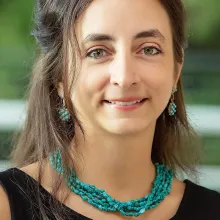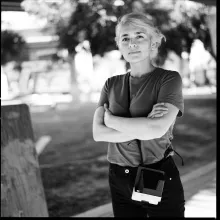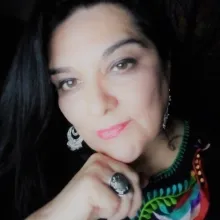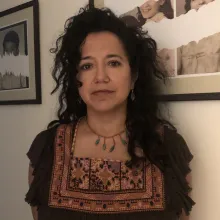Carmella Scorcia Pacheco | Department of Spanish and Portuguese | College of Humanities

Feminine-Voiced Balladry of the U.S. Southwest Borderlands: Recovery and Poetics of “La indita de Juliana Ortega” and “La indita de Paula Ángel”
This project focuses on investigating feminine-voiced folkloric narratives of Mexican-American women in the U.S. Southwest Borderlands as a means to recover literary narratives during the mid-nineteenth century. Carmella utilizes folklore as the primary vehicle for understanding the struggles women faced and the context in which they faced them. Specifically, Carmella focuses on feminine-voiced oral balladry of the borderlands known as inditas in which Mexican-American women both composed their own narratives and were also portrayed as protagonists by their male counterparts. Unique to the Southwest region, inditas have characteristics similar to the corrido, yet they are sung in the first person and are predominantly composed and sung by women. This project responds to the urgent need to recover Mexican-American women’s voices during the territorial period of the Southwest Borderlands, a pivotal moment of transformation that continues to impact the racialized and gendered hierarchies of the region. This is the first study which analyzes the poetics of two primary sources of feminine-voiced balladry of the Southwest Borderlands including La indita de Juliana Ortega and La indita de Paula Ángel. Carmella argues that we must look at cultural narratives in the form of folkloric oral traditions of the U.S. Southwest Borderlands to critically understand the relationship with the past in order to create a more equitable present in which many voices contribute to a collective history.
Claudia Mariel Miranda Ramirez | School of Art | College of Fine Arts

The dust or the -solar-wind, perhaps
In 2006 a maquiladora from Taiwan named Eson Multiwin was established on the borders of Claudia's barrio Las Cumbres. For the last five years, the maquiladora has been manufacturing tiny pieces for the famous “eco-friendly” Tesla electric vehicles. Elon Musk the CEO of Tesla and Space X has said many times that he seeks to colonize the territories of Mars and become emperor. Through their labor, Maquila workers of Las Cumbres are involved with his vision whether they know or not, for the financialization of a stellar colonial project. A plan that presents itself as the opportunity we have to survive as a species, into the future. The labor dynamics of the maquiladora, as a production apparatus, and its international circulation of capital through corporations, has made Claudia think about the updated forms of exploitation of territories, commodity production, and regulation of the worker bodies that inhabit the Global South. Claudia's aim in this project is working beside her neighbors who are workers, and ex workers of the maquila to explore, understand and learn about the multiple ways that they are imagining three primary concepts: community, labor, and future. Claudia will achieve this through conducting a science fiction workshop in the front yard of her home—a space that has been hosting grassroot activities since the nineties, without knowing it was helping housing immigrant workers, supporting domestic abused women and children, and youth at risk, among many others.
Elizabeth Gaxiola | Department of Teaching, Learning, and Sociocultural Studies | College of Education

La Casa de Papel-El Ruido de Tus Voces/The Sounds of Our Border Communities
Individuals encounter challenges during their lifetime. These encounters exist in our homes, schools, relationships, work, and at times in everyday lives. These trials may be a result of the lack of acceptance by others due to our gender identity, gender choice, the color of our skin, the accent in our voices, our weight, or simply because we choose to be different. Unfortunately, in society the unfair and prejudicial treatment of people exists in groups based on race, gender, disability, religion, and so forth. When we are travelers through these spaces, we may feel fear, uncertainty, despair, confusion and other emotions. What outlets are we afforded to express these emotions? Would it be helpful for ourselves and others if we shared our experiences, thoughts, and untold or invisible stories? Would creative expressions, for example, through poetry, creative writing, testimonios (testimonies/narratives), and pláticas (talks) provide us with opportunities to name and narrate our worlds? In contrast to the struggles we face as individuals and society, we also have dreams, visions, goals and achievements. Where are these affirmations notated and secured? Wouldn’t it be auspicious for everyone to hear the encouraging voices of others? Sharing a space for creative expression facilitates verbal and non-verbal expression, problematizes oppression, and provides emotional healing. These arts-based activities and testimonios will be explored in a collective setting “con y para la comunidad-with and for the community.”
Jacqueline Arias Thompson | School of Art | College of Fine Arts

Terrains of Separation
Terrains of Separation is a multi-media art cartography project and intervention against nationalistic boundaries that employs non-traditional mapmaking. Jacqueline will be creating 2D maps by layering map elevation data, archival images and photographic imagery. These maps will tell of the journeys and paths migrants and their families experience when traversing from one side of the border to the other. Jacqueline will explore the physicality, distance and the experience of loss that political structures create between families. Using historical cartographic research, this project will interrogate cultures of maps and mapmaking to upend notions of a fixed one-perspective view of our world and our topography. In doing this, Terrains of Separation will highlight the multi-perspective experience of latinx people, which is often dismissed. This project proposes that these elevation lines and collections of immigrants’ journeys will embody stories of courage, trauma and faith, which all immigrants experience when they are forced to leave their home country and culture. These unconventional maps will combine traditional topographic mapping techniques with oral histories, video and photography to question the divisions created by political boundaries, reinserting our latinx experience and revealing elements of our humanity that these systems are attempting to erase. Research and content from Terrains of Separation will be added to an online bilingual interactive map as a way to engage a broader and diverse community.
Ramón Cesar Méndez | Department of Spanish and Portuguese | College of Humanities

I as Others And Other Borders: Towards a Po-ethics of Community
I as Others and Other Borders posits poetry as a space of language where community unfolds through exposure and communication with others. Such communication entails an approach to language that makes us aware of our encounters and the way that those encounters make up a community of others that inhabit us; in other words, we are made up of others. As a writer and perennial border crosser who grew up in the Ciudad Juárez-El Paso region, Ramón holds the conviction that poetry enables those who read and write it to process the often overlooked nuances of border experience through the meditation of the latent power of words and its configurations. This, in turn, allows one to make sense of experience while at the same time serving as a voice that contends mainstream abstract narratives of region, more specifically, the borderlands as an apocalyptic setting open to only two positions: captor/captive or victimizer/victim. This project contends that not only does literature induce a sense of community, but also that self-referential autobiographical writing paves the way for the recognition of a community of others within us, that is, a community of other experiences and other lives which forge our subjectivity. Hence, this project posits community through workshops as a self-referential space where we ethically engage in the common good of language. This project is intended to be included in a final chapter of my dissertation.

